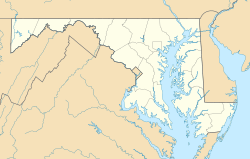Germantown, Worcester County, Maryland facts for kids
Quick facts for kids
Germantown, Maryland
|
|
|---|---|
| Country | United States |
| State | Maryland |
| County | Worcester |
| Elevation | 30 ft (9 m) |
| Time zone | UTC-5 (Eastern (EST)) |
| • Summer (DST) | UTC-4 (EDT) |
| ZIP code |
21811
|
| Area code(s) | 410, 443, and 667 |
| GNIS feature ID | 590294 |
Germantown is a small, special place in Worcester County, Maryland, United States. It's an unincorporated community, which means it's not officially a town with its own local government. Instead, it's part of the larger county. You can find Germantown at the spot where Germantown Road and Bethel Road meet, just southeast of a town called Berlin.
Contents
Discovering Germantown: A Special Community
Germantown is known as a historically black community. This means that for a long time, many African American families have lived and built their lives here. It's a place with deep roots and a rich history.
A Look at History
This community is home to several AME (African Methodist Episcopal) churches. One of them is Tyree AME. This church was started by relatives of a famous Methodist minister, the Rev. Dr. Charles Tindley. He wrote a hymn called "I Shall Overcome." This hymn later inspired the very well-known civil rights song, "We Shall Overcome," which became a symbol of hope and change.
Germantown Road connects to Route 113 and becomes South Main Street in Berlin, Maryland. Berlin was even named "America's Coolest Small Town" in 2014! Some people think the name Berlin might have come from "Burley Inn."
Historically, Germantown and Berlin developed quite separately. Today, some people of different backgrounds live on the east side of Route 113. However, most black families still own property in Germantown, on the east side of Route 113. Parts of Germantown, including Tyree church, are actually inside Berlin's town limits.
Nature Around Germantown
Germantown is in a low-lying area of Worcester County. This means it's part of a special wetland ecosystem that helps feed into Newport Bay. Long ago, people dug and maintained ditches carefully. This helped prevent flooding and allowed farmers to grow crops.
The soil in Germantown is often very good for farming. It's a rich, dark soil called loam, with a clay-like base. You won't find many stones here! However, the ground can be soft, especially in spring after snow melts and it rains a lot. Most homes here use wells for water and septic systems for waste.
The forests around Germantown are thick and full of trees. You'll see many sweet gum trees, which are often the first to grow in an area. Later, huge loblolly pines grow tall and strong.
Keeping Family Homes
Many families in Germantown have owned their homes for a very long time, some even since the time of Reconstruction (after the Civil War). It's important for them to keep these family homes. Sometimes, if property taxes aren't paid for two years, the county can auction off the property. This can be a challenge for families.
However, many families work hard to make sure their homes stay in the family. While some properties are rented out by owners who live elsewhere, the homes where families live are often cared for with great pride, no matter how simple they might be.
 | Aurelia Browder |
 | Nannie Helen Burroughs |
 | Michelle Alexander |


